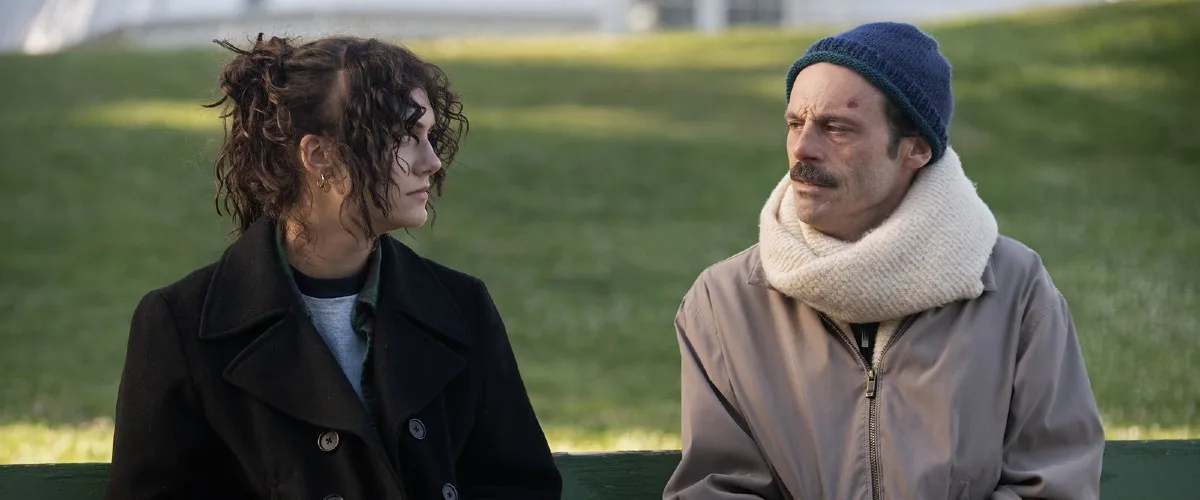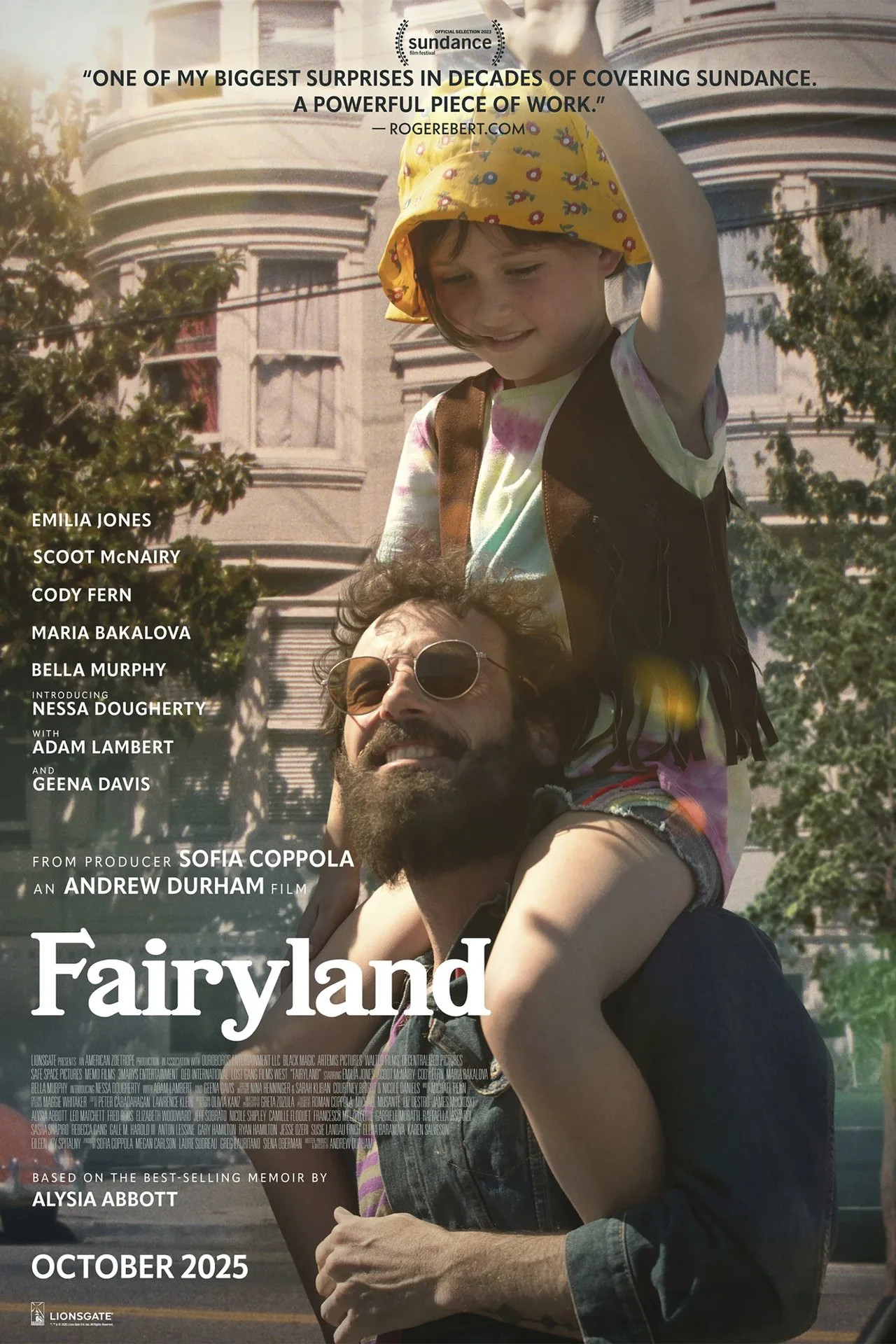“Fairyland” is a lot of things, all remarkable. Adapted from a bestselling memoir by Alysia Abbott, whose father was the acclaimed poet Steve Abbott, it is the story of a girl raised by her single dad in San Francisco’s Haight-Ashbury district. It starts in the 1970s, a counterculture hangover with glimmers of hope for a tolerant future, and continues through the 1980s and early ’90s, when the AIDS crisis killed more than 130,000 Americans, including Steve Abbott. It’s also about being a child, being a parent, and how the roles reverse when the parent gets old or sick. It’s about how parents never stop worrying that they’re messing up and ruining their children. And it’s about how, when the children are old enough, they begin to judge their parents, sometimes harshly.
The story begins with Steve learning that his wife, Alysia’s mother, has died in a car wreck. Alysia (played by Nessa Dougherty in the early scenes) is so young that it takes her a while to understand that mommy isn’t coming back. Her father, Steve (Scoot McNairy), is a skinny, soft-spoken poet with woolly hair and an unkept mustache. He only dated men until he met Alyssa’s mother—”my best friend,” he calls her. After her passing, Steve is given the chance to let relatives raise Alysia, but instead decides to take her with him to San Francisco. He wants to seek success as a writer and reconnect with the person he was before he married Alysia’s mother: a gay man.
Father and daughter live in a rooming house. The residents include an Italian pot dealer named Skid (Annabella Peregrina), a transgender performer named Johnny who recently spent two years in a Buddhist monastery (Ryan Thurston), and a good-looking young guy with a Southern accent who calls himself Eddie (Cody Fern). Alysia calls him Eddie Buddy, cutely misunderstanding how her dad begins sentences addressed to him: “Hey, Eddie, buddy….” Alysia has her own room, and her dad has his. Sometimes Eddie stays overnight in Dad’s room. The house feels more like a dormitory or a youth hostel than a regular apartment building. The movie is called “Fairyland” to reclaim a homophobic nickname that bigots applied to San Francisco, and also because the house and the city feel magical.
So does this movie, even when it’s putting its characters and the audience through the wringer. Writer-director Andrew Durham brought the story to the screen with help from executive producer Sofia Coppola, who saw herself in it. Like Alysia, she grew up in San Francisco in the ’70s and ’80s on the shoulders (and in the shadow) of a brilliant, famous, creative father who loved his family and was loved by them, even when he made their lives hell. “Fairyland” is also a movie about life in a commune and how it affects children who grow up in one, for better and worse.
One of the many things that makes “Fairyland” remarkable is the detached but compassionate way it presents everything, including scenarios that now drive the right-wing outrage machine, like gay men raising children. Johnny initiates Alysia into the world of makeup, as her late mother would have, and remarks that when he was a boy, he asked for dresses and was denied them. “I never understood why only girls get to have beautiful things,” he says.
Eddie Buddy becomes an adjunct father. When Alysia wakes up in the middle of the night, distressed after watching a horror movie on TV, she goes into her dad’s room and climbs into bed next to him. Eddie Buddy slumbers next to Steve, as partners do. It’s exactly what happens in the homes of straight couples with kids, and the movie presents it as unremarkable. When San Francisco is devastated by the AIDS epidemic, Steven visits a hospice once a week to comfort a friend who’s dying. These visits are presented as nothing more than an example of compassion expressed through action, no different than if the friend were dying of liver failure or lung cancer.
Eddie Buddy isn’t around long. Neither are her father’s other boyfriends. The revolving door of Steve’s relationships adds chaos to a life that is already chaotic. The movie doesn’t pretend that’s a good thing. It just recognizes that whatever situation you grew up in is the one that feels normal to you, even though it seems abnormal to others—and that there is really no such thing as normal, only behavior that’s sanctioned by the dominant culture and behavior that isn’t.
The movie presents 1970s San Francisco as a place that remained a shabby oasis for society’s outcasts, even as bigots spoke its name as if it were a synonym for depravity. A radio snippet notes the day that San Francisco mayor George Moscone, and Harvey Milk, the city’s first “out” gay member of the Board of Supervisors, were shot to death by Milk’s colleague Dan White, a Christian conservative who described himself in a campaign flyer as the face of “thousands upon thousands of frustrated, angry people…waiting to unleash a fury that can and will eradicate the malignancies which blight our city.” We also hear a snippet of a radio report about a campaign led by Anita Bryant, spokesperson for the Florida Citrus Association, to overturn a Florida statute forbidding housing discrimination against gays and lesbians. (It succeeded.)
At the same time, the movie recognizes that certain things are simply unacceptable in parenting in any nation or culture. One is allowing a child to live in a messy house with empty wine bottles, beer cans, and full ashtrays everywhere, where people come and go at all hours of the night, often drunkenly.
Another is being neglectful and calling it hands-off parenting that teaches self-reliance. A creep spots Alysia walking home from school after getting off the wrong stop on her city bus route, offers her a ride home, and opens his passenger door. A random woman saves her from whatever horrible thing was about to happen and escorts her home. By the time Steve finally shows up there, the sun has gone down. The woman chastises him for permitting a girl that young to ride a bus by herself. “She knew where to get off the bus!” he whines in protest. “I wrote it down!” Alysia’s maternal grandmother (Geena Davis) uses her regular phone calls with Alysia as fact-finding exercises, looking for unflattering details that could be used to strip Steve of parental custody.
“Fairyland” allows room for differences of opinion on certain aspects of Steve’s parenting, but none on others, always sensibly. And yet, even the film avoids blanket value judgments, some of the dialogue is too noticeably expository, to an extent that could momentarily take you out of the story. And there are stretches where the film isn’t allowed to breathe, especially when Alysia becomes an adolescent, prepares to go off to college in New York, then returns for the movie’s heartbreaking finale. But while these missteps prevent “Fairyland” from achieving its fullest potential, it’s thoughtful, tenderhearted, and substantial. And the lead performances are crystalline in their clarity.
McNairy continues his streak of great work in movies worth watching. He’s reminiscent of a certain kind of actor from the era in which the film is set: think of Warren Oates, Harry Dean Stanton, Scatman Crothers, and Robert Duvall, who seemed like they were existing rather than performing. His filmography has such a consistently high level of quality that he’s gone beyond being one of those actors you’re always glad to see and become something more precious: an actor whose presence guarantees that a movie will be good, and maybe more than that.
Dougherty is just right as the young Alysia: the child as recording device, registering emotions as well as events. (Durham and his cinematographer Greta Zozula shoot some of the early sections from a child’s point of view, at hip height.) It’s impossible to imagine how Emilia Jones’s performance as the young adult incarnation of Alyssia could be improved. She’s extraordinary, especially when the camera focuses on her face, and we hear things happening offscreen while watching her to see how she reacts.
Watch for the scene where Alysia takes out her many resentments on her dad and his current boyfriend, Charlie (musician Adam Lambert). Dad asks her opinion on their outfits: head-to-toe leather and studs. She says they look “like all the other f**s,” then instantly looks away from them—but slightly, like she’s just realized that she crossed a line but wants to hide the realization from Charlie and her dad. After Steve storms out, Charlie tells her, “You should know better,” and her look mingles performative defiance, guilt, and exhaustion.
But the love between father and daughter is never in doubt. They see each other clearly even when they’re fighting. They push each other’s buttons and have fun doing it. “How did I raise such a normal girl? Where did I screw up?” Steve says to his now college-age daughter, as she’s putting on makeup before joining him at a party celebrating the release of his latest book of poetry. “Do you want me to go down the list?” she replies, “because we’ll miss the party.”
Steve laughs. But at the party, he mortifies her by reading a poem that, like all his work, is kind and loving but brutally frank, and that happens to include extremely personal observations about Alysia and her mother. She’s not mad about the poem, but she’s upset about her father’s thoughtlessness in inviting her to an event where it would be read to a roomful of strangers without warning her ahead of time. Angry and embarrassed, she leaves the party early, meets up with friends, gets drunk, and dances off her anger in a nightclub. On her way home, she encounters her father sitting alone at a small table in front of a restaurant. He smiles and invites her to join him, as if she hadn’t chewed him out a few hours earlier. Alysia sits down and they talk, just as they’ve always done.
This is an honest, real movie about people living big lives during tumultuous times, and coming through damaged but wiser. Steve puts it best: “What seems most outlandish in our autobiography is what really happened.”




















